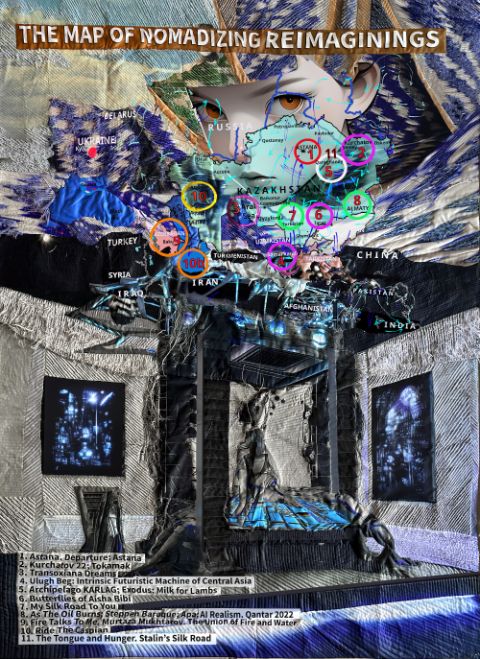Almagul Menlibayeva

Almagul Menlibayeva, The Map of Nomadizing Reimagining #2 (2023). Courtesy Almagul Menlibayeva
The Tongue and Hunger. Stalin’s Silk Road is a powerful five-channel multimedia installation by Almagul Menlibayeva, recounting the tragic story of the famine that killed between forty to forty-nine percent of the Kazakh population. The human-induced famine hit several areas of the USSR in the early 1930s, arising from the Soviet push for collectivization as a part of the First Five-Year Plan. At its core, the installation features a film inspired by Menlibayeva’s great-aunt Bopish, who navigated the Soviet social system amid immense deprivation, grappling with the disappearance of her two children. The installation combines academic research with personal narratives, serving as a poignant reminder of the importance of preserving collective memory and acknowledging the resilience of communities that suffered historical injustices. In The Tongue and Hunger. Stalin’s Silk Road, the artist aims to re-examine the past and explore the economic relations forged under authoritarian and totalitarian geopolitical regimes. The legacies of industrialization, modernization, and so-called progress, which contributed to tragedies like Asharshylyk, remain highly relevant today as they shape struggles against colonial ideologies and attempt to forge a new path forward. Accompanying the video works is The Map of Nomadic Reimaginings, a post-digital textile piece that maps the locations of Menlibayeva’s twelve video works, which deal with dark chapters of modernity: nuclear test sites, sites of ecological catastrophes, and mass repressions.
Works in the exhibition:
The Map of Nomadizing Reimagings (2023), 220 × 160 cm, post-digital textile
The Book Keepers (2022–23), from The Tongue and Hunger. Stalin’s Silk Road installation (2022–23), 2-channel video, 40'. Credits: Ainash Mustoyapova, Nurlan Dulatbekov, Zauresh Saktaganova, and Larisa Kharitonova (interviewees), The Karaganda University
Stalin’s Silk Road (2022–23) from The Tongue and Hunger. Stalin’s Silk Road installation (2022–23), 3-channel video, 40'. Credits: Leyla Mahabaeva (interviewee) and Aigerim Akkanat (performer)
Courtesy of the artist